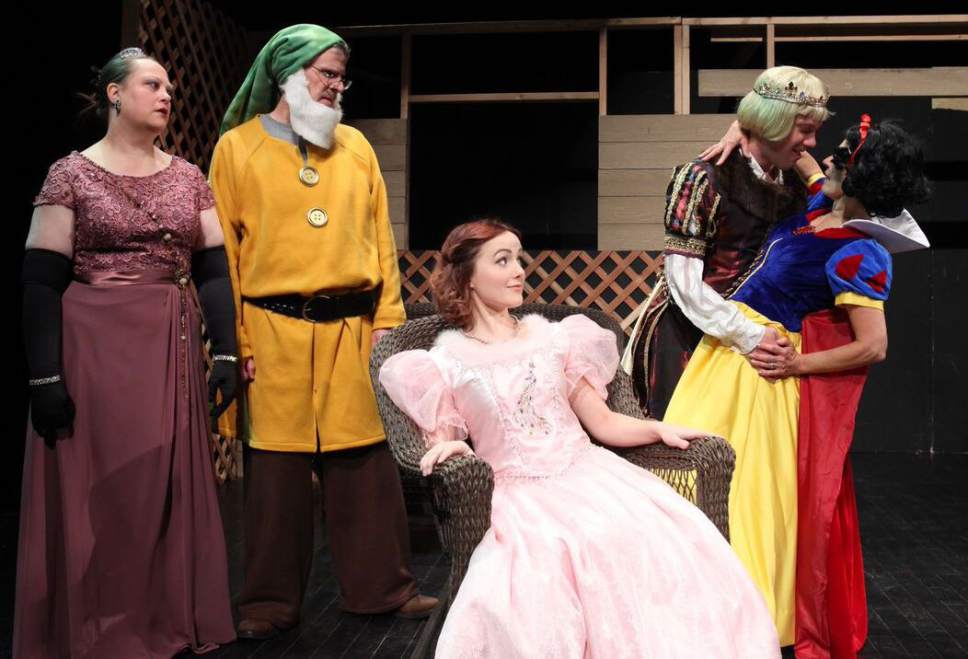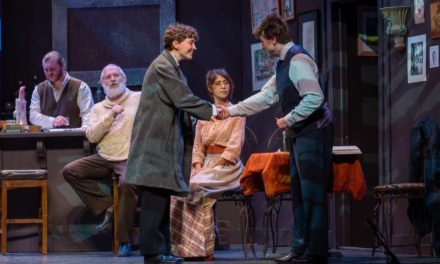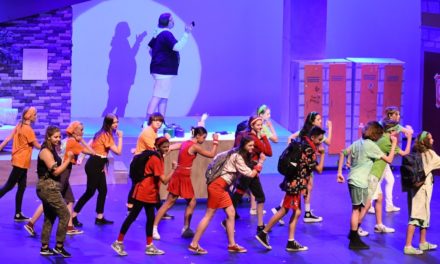SALT LAKE CITY — There isn’t much wilderness in Eugene O’Neill‘s 1933 comedy-drama Ah, Wilderness—until the final scene, when it serves as a lovers’ getaway. Almost the entire show takes place in the living and dining room of an upper-middle-to-lower-upper class Connecticut family named the Millers. Westminster College‘s current production of the show features a student cast (plus one 11-year-old) with technical and direction from a mix of students and department staff.

Show closes November 23, 2019.
The plot revolves around an eventful 4th of July and a night of wanton rebellion by the 16-year-old Richard, portrayed by Jordan Reynosa. As revealed in the first scene, Richard has gotten himself neck-deep in communist literature and lusty romance poems. After his girlfriend dumps him, he decides to act out some of what he’s read. Reynosa does a lot of good work in the play’s most dynamic role. During its course, Reynosa plays a newfound socialist zealot, a dour and detached intellectual, a wayward youth in way over his head, and an innocent schoolboy with a crush on the girl next door. Reynosa’s ability to capture the breadth of action and emotion in the part was admirable.
The family is helmed by father Nat (Alvaro Cortez) and mother Essie (Sara Peel). Both are astounding in their portrayal of characters 30 years older, I presume, than their actual ages. Cortez does an excellent job as the good-hearted father. His part requires a ton of dialogue and monologue, and I enjoy his commanding, no-nonsense approach to the character. Peel is an exceptionally natural presence on stage and perfectly embodies the maternal Essie. The strong work by Cortez and Peel provides a solid foundation for the play and many of its most enjoyable moments.
The play is populated with entertaining supporting characters inside and outside the family. There is the family friend/harmless drunk, Sid (Abenadie Hofeling), who has a long history of misromance with old maid Lily (Mauri Hefley). Kaitie Smith is ebullient and effective as daughter, Mildred. Along with Peel, Smith gives the most natural performance of the evening.
Several of the actors in smaller roles did fine work, as well. I enjoyed the evil neighbor, played by Jaiden Castleton, (who unfortunately and inevitably was also father to Richard’s crush) in a short but impactful scene. Ryeleigh McCready gave a dead-on performance as Belle, a lady of the night circa 1906 with a modest dress and very immodest intentions for a certain teenager who finds himself on the wrong side of the tracks. Emir Sabic was also surprisingly strong as the surly Scottish barkeep who managed a place of ill repute.
The production was on sound technical footing and was directed by department chair Jared Larkin. Costumes by assistant professor Spencer Potter were a highlight of the evening: the early 20th century outfits were appropriate and effective without drawing attention to themselves. Spencer Brown‘s lighting and set design did their jobs well, and hair and makeup designer Abbie Hagen outdid herself on Sid’s prodigious beard. I did wonder why Nat’s facial hair was darker than the hair on top of his head. Maybe he dyes. Or maybe bodies are just weird like that.
There were no major mistakes technically or in acting, which was admirable. That said, despite strong acting across the board and great potential in all the actors, the play was far from perfect. It seemed like a lot of the speech was shouted instead of expressed. Part of the reason for the shouting is likely due to use of the mic-less auditorium, although the area is small enough that hearing the actors was not a problem. I also often wasn’t sure what the characters were laughing at. These issues would likely abate if the actors slowed down and internalized their dialogue and characters, and the issues will be addressed naturally in time as they gain additional experience.
The 90-year-old plot and dialogue haven’t exactly aged perfectly. The 1930s’s slang was often unintentionally hilarious, and I groaned at the play’s numerous, dubious “men are X, women are Y” declarations. Most worryingly, at the end of the play the newly enlightened protagonist declares that, “suicide is the act of a coward”—a harmful and ignorant idea (in a college production, no less) that the director would do well to address in talk-backs or director’s notes.
Unlike O’Neill’s other plays, the central family is generally functional, and despite two parallel plots involving alcohol abuse, everything works out all right in the end. Lessons are learned and wrongs are more or less righted. At the same time, it’s not hard to see the playwright’s signature darkness creeping in the corners of the show—this play is apparently O’Neill’s only one with a happy ending.
The play’s content is likely appropriate for most ages. If it was a film, it would fall within the PG to PG-13 range. It contains a large amount of biblical swears as well as underage drinking, smoking and a lengthy bar scene between a minor and a prostitute. Content in mind, the play is performed and directed well at the college level. Though O’Neill’s only happy play has some faults due to age, Westminster puts on an impressive production worthy to see.

This review generously sponsored by a grant from the Salt Lake County Zoo, Arts, and Parks program.





